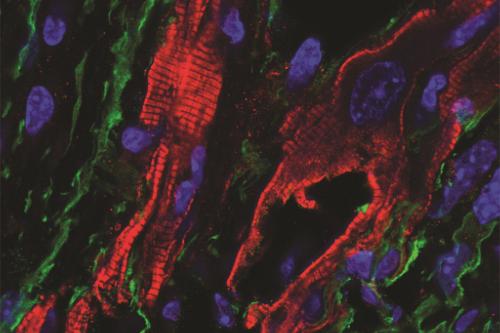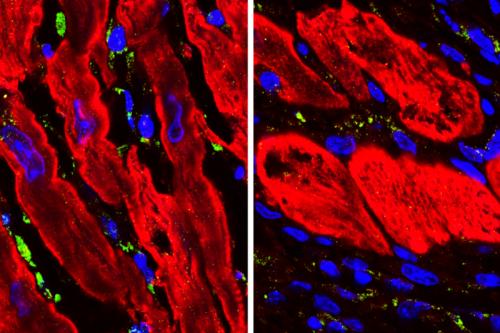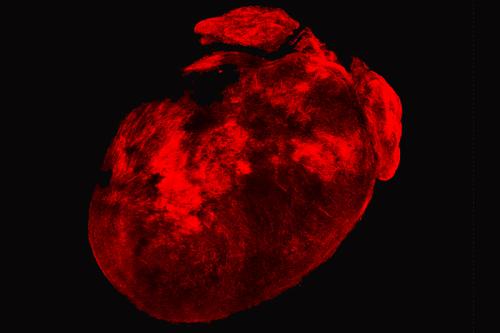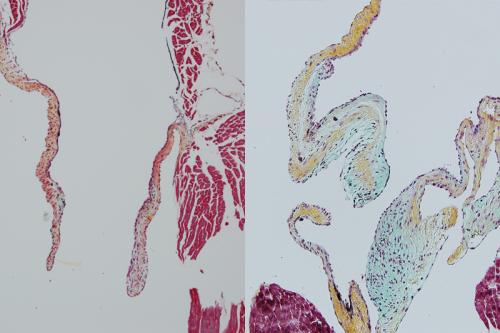
Glossary
Cardiac stem cells
Tissue-specific stem cells Mature stem cells that are found in many adult organs and tissues (such as the brain and muscles). Unlike pluripotent stem cells, they can only produce the cell types found in the organ or tissue they inhabit. They're responsible for replacing cells that have been lost due to natural wear and tear, injury and illness throughout life; however, their ability to do so decreases with age. Tissue-specific stem cells Mature stem cells that are found in many adult organs and tissues (such as the brain and muscles). Unlike pluripotent stem cells, they can only produce the cell types found in the organ or tissue they inhabit. They're responsible for replacing cells that have been lost due to natural wear and tear, injury and illness throughout life; however, their ability to do so decreases with age. found in the heart that are capable of limited self-renewal When stem cells self-renew, they divide to make identical copies of themselves. self-renewal When stem cells self-renew, they divide to make identical copies of themselves. and differentiation The process by which stem cells transform into specific, specialized cell types with distinct functions and features. differentiation The process by which stem cells transform into specific, specialized cell types with distinct functions and features. into heart muscle cells and the cells that make up the interior lining of blood vessels. These cells are found in very small numbers in the adult body and cannot currently be produced in large enough quantities in the lab to be useful in regenerative medicine A field focused on developing and applying new therapies and techniques to repair, replace or regenerate tissues and organs and restore function that has been lost due to aging, disease, injury or genetic defects. regenerative medicine A field focused on developing and applying new therapies and techniques to repair, replace or regenerate tissues and organs and restore function that has been lost due to aging, disease, injury or genetic defects. applications.
Developing therapies to repair the heart
Regenerative medicine A field focused on developing and applying new therapies and techniques to repair, replace or regenerate tissues and organs and restore function that has been lost due to aging, disease, injury or genetic defects. Regenerative medicine A field focused on developing and applying new therapies and techniques to repair, replace or regenerate tissues and organs and restore function that has been lost due to aging, disease, injury or genetic defects. and stem cell research have tremendous potential to revolutionize the treatment of cardiac disease. Center members are conducting research that may lead to discoveries that will reverse or repair heart muscle damage and offer clinical alternatives for the millions of Americans who are born with or develop heart disease.
For example, the heart has a limited ability to regenerate damaged tissue after a heart attack. Current drug therapies slow the progression of heart failure but are not curative and heart transplants can only be offered to a very limited number of patients. Our scientists have focused their research on identifying cardiac stem cells and understanding the processes by which they turn into heart cells with the hopes of developing cell replacement therapies for regenerating heart muscle and lessening the need for transplantation.
Cardiac stem cells have the potential to differentiate into all the cells that make up the heart, including heart muscle cells, smooth muscle cells and endothelial cells. Center members have demonstrated that cardiac stem cells can be developed from induced pluripotent stem cells iPS cells are cells taken from a patient that are reprogrammed so that they can undergo differentiation into any type of cell in the body. By maintaining the genetic code of the patient, iPS cells play a crucial role in disease modeling and regenerative medicine. induced pluripotent stem cells iPS cells are cells taken from a patient that are reprogrammed so that they can undergo differentiation into any type of cell in the body. By maintaining the genetic code of the patient, iPS cells play a crucial role in disease modeling and regenerative medicine., which we hope will allow an unlimited supply of personalized cardiac stem cells to be produced for each patient.


